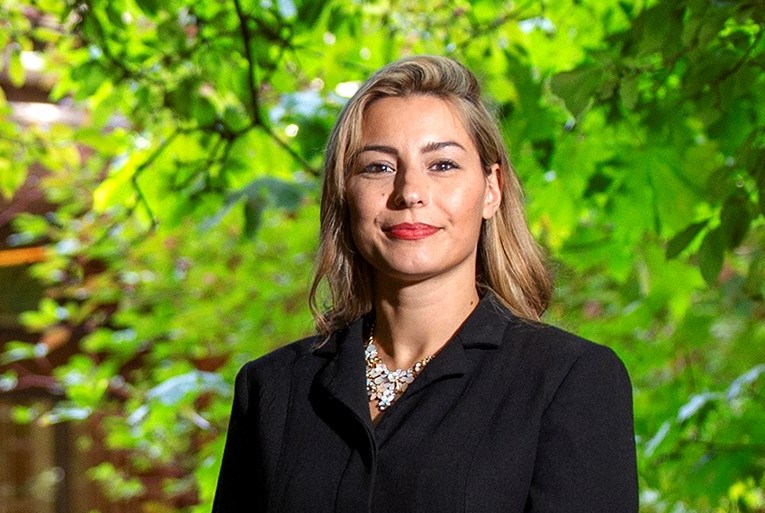This article has been amended since first posting to clarify program funding. The program is funded through a provincial government grant for local governments.
The West Vancouver Memorial Library is welcoming its first-ever climate writer in residence.
Starting this week through to the end of March, northern Dene writer from Yellowknives First Nation Katłįà (Catherine) Lafferty will look to give voice to the climate crisis with an Indigenous perspective, both through writing and holding events. Lafferty will also be working on her own writing project during the residency.
“My vision for engaging the community during the residence at the library will be to start by hosting open and interactive sharing circles with members of West Vancouver’s community, including different spaces for youth and seniors to gather input on what they hope to learn from me during the residency,” Lafferty said.
Lafferty’s memoir Northern Wildflower was the top-selling book in the Northwest Territories when it was released in 2018. Her recently released novel Land-Water-Sky/Ndè-Ti-Yat'a was nominated for an Indigenous Voices Award.
The residency position is funded by a grant from the provincial government's BC Safe Restart Fund for Local Governments program. The grant is part of the BC Economic Recovery Plan, which sought to create jobs and opportunities, support strong communities, and act on climate change.
Lafferty said she applied for the residency program as a way to lend her strengths as a writer to those trying to find ways to make sense of the issues surrounding the climate crisis, and to spark an “enthusiasm” that might prompt communities to join in efforts to mitigate climate change.
“My latest novel Land-Water-Sky, I’ve been told, is considered by readers to be a timely book on the importance of respecting the natural world. It covers the topic of environmental injustice through the dispossession of land, the witnessing of climate change in the north, and the capitalistic nature of the industrial revolution that has not left much room for the natural world to coexist,” Lafferty said.
“It’s through this type of storytelling I believe I can assist library participants to join me during this residency and open themselves to learning from Indigenous knowledge holders about the intricate details of nature from a storied perspective on why it is important to honour and reciprocate what nature has to offer and listen to what it is asking of us.”
Personally, Lafferty notes Potawatomi writer Robin Wall Kimmerer’s book Braiding Sweetgrass to be one of the most impactful books she’s read when it comes to climate change and the environment.
“It focuses on the natural world, based on her memories of Indigenous knowledge systems growing up. Kimmerer is able to give us detailed insight into solutions on how to go back to caring for the land once again and learning how to live in the essence of nature rather than considering ourselves separate from it.”
She suggests that it’s one of the books people should be reading right now, as it has an innate ability to bring readers into a world that is respectful of nature.
“Through this book we learn that a strawberry is not only delicious, but it is also connected to our heart. We learn that a swamp has qualities that go far beyond the unpleasant sight of it. This book is a gift because it teaches us how to see with more than just our eyes. It breaks down ecology into simple yet complex inner workings in a way that helps us to see the interconnectivity of nature and incorporate these principles of nature into our everyday lives.”
Lafferty said she looks forward to holding writing group exercises during her residency, specifically one which would guide the group into writing a short story from a natural world perspective.
“By giving nature a voice, we remember that it too is a character and not just the backdrop of a story. In fact, unlike any other characters, nature it is not only one part of the story, it connects with all characters and without it we can’t exist and for that reason we must take care of it in order to take care of ourselves collectively.
“Tackling climate change starting from the strong roots of Indigenous worldviews in caring for the land, water and animals is where we must begin if we want to heal the earth.”
Excited to work with West Van’s youth, Lafferty said that even though they may be worried about the future, there is always hope.
“Change can sometimes happen slower than we want it to but there are people all over the world coming together for a cause that is greater than ourselves and in that we can feel some sense of assurance that things are moving in the right direction,” she said.
“We desperately need the youth of tomorrow to help leaders invent and accept new technologies to replace the old industrial revolution and move towards a change that is greater than ourselves. One that is not focused on profit, capitalization or archaic policies but on working together for the greater good.”
WVML’s head of community experience, Tara Matsuzaki, said Lafferty’s expertise will help to further the library’s work around the climate crisis.
“Given the recent extreme weather events we’ve been seeing, this work feels more important than ever,” she said.
A welcoming event for Lafferty will be held on Saturday Jan. 22, from 2 p.m. to 3:30 p.m., via Zoom. The event includes a traditional welcome, a moderated question-and-answer period and a reading from Lafferty. More details can be found at the Memorial Library website.
Charlie Carey is the North Shore News’ Indigenous and civic affairs reporter. This reporting beat is made possible by the Local Journalism Initiative.



